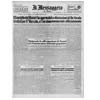National Content: Italy
The Cabinet approves treaties of the EEC and the Euratom
| Source | Newspaper ”Il Messaggero” (March 27th, 1957) |
| Event referred to | March 25th, 1957: birth of the EEC |
| Technological characteristics | Type of file : text Extension: pdf Dimension of the file: 663kb Availability proposed: Downloadable |
| Description of the source | Kind of source: Front page of a newspaper Origin of the source: Library (Biblioteca Augusta – Perugia) Language: Italian Copyright issues : Full availability |
| Contextualisation of the source | This issue of “Il Messaggero” is printed in Rome on March 27th, 1957. In this historical moment there is a great political and economic turmoil in the capital city. During this first decade following WWII, Italy is busy rebuilding the nation. Mario Segni, who is a member of the Christian Democracy, leads the government. Although this party is momentarily going through a crisis, the Christian Democrats represent the biggest party. During the 1958 elections two eminent representatives of the center-left of the Christian Democracy emerge: Amintore Fanfani (the left exponent of the DC) and Aldo Moro (the moderate exponent of the DC). These are the years of the economic boom promoted, among other things, by the Marshall Plan (European Recovery program – ERP). However, some contradictions still exist: the increasing social and economic difference between the North and the South of Italy, the increasing unemployment rate and as a consequence of this the emigration of workers who choose to look for better opportunities abroad. |
| Interpretation of the source | Due to the short life span of the Italian Republic, the author chooses to focus his attention on the national political contest with its internal problems of institutional reforms and the strengthening of the democracy. This newspaper is considered moderate and values the “centre” of the Christian Democracy. The Rome Treaties are considered an important passage in the peace process Europe is going through and in this world that some Italian and European politicians are building with such great determination. |
| Original Contents | I rappresentanti di CISL e UIL avevano le opinioni più ottimistiche, mentre la CGIL e il PCI non erano così soddisfatti per i Trattati. È comprensibile la posizione favorevole della DC, perché alcuni suoi esponenti furono tra i principali artefici di questi trattati. Altri due esponenti, Cantalupo per i monarchici e Anfuso per il MSI, sono sicuramente meno propensi, ma appartengono a partiti politici con programmi fortemente impregnati di nazionalismo. Naturalmente, a parte le opinioni differenti a seconda dei partiti, c’era un generale ottimismo per una futura unificazione politica che seguisse quella economica. |
| Original Contents (English Translation) | The CISL (Christian-Democrats trade union) and UIL (Socialists trade union) trade-unionists had the most optimistic opinions but CGIL (trade union in which Communists were the majority) and the Italian Communist Party weren’t so satisfied for the treaty. You could understand the positive position of the Christian Democrats because drew up the agreement itself. The two exponents, Cantalupo for the monarchical, and Anfuso for MSI (Movimento Sociale Italiano – the Italian right party born after the end of WW2), are more unwilling than the others but their political programmes are more and more nationalistic. Of course, beyond the different political parties’ opinions, there was the general optimism for a next political union in addition to economic one. |
